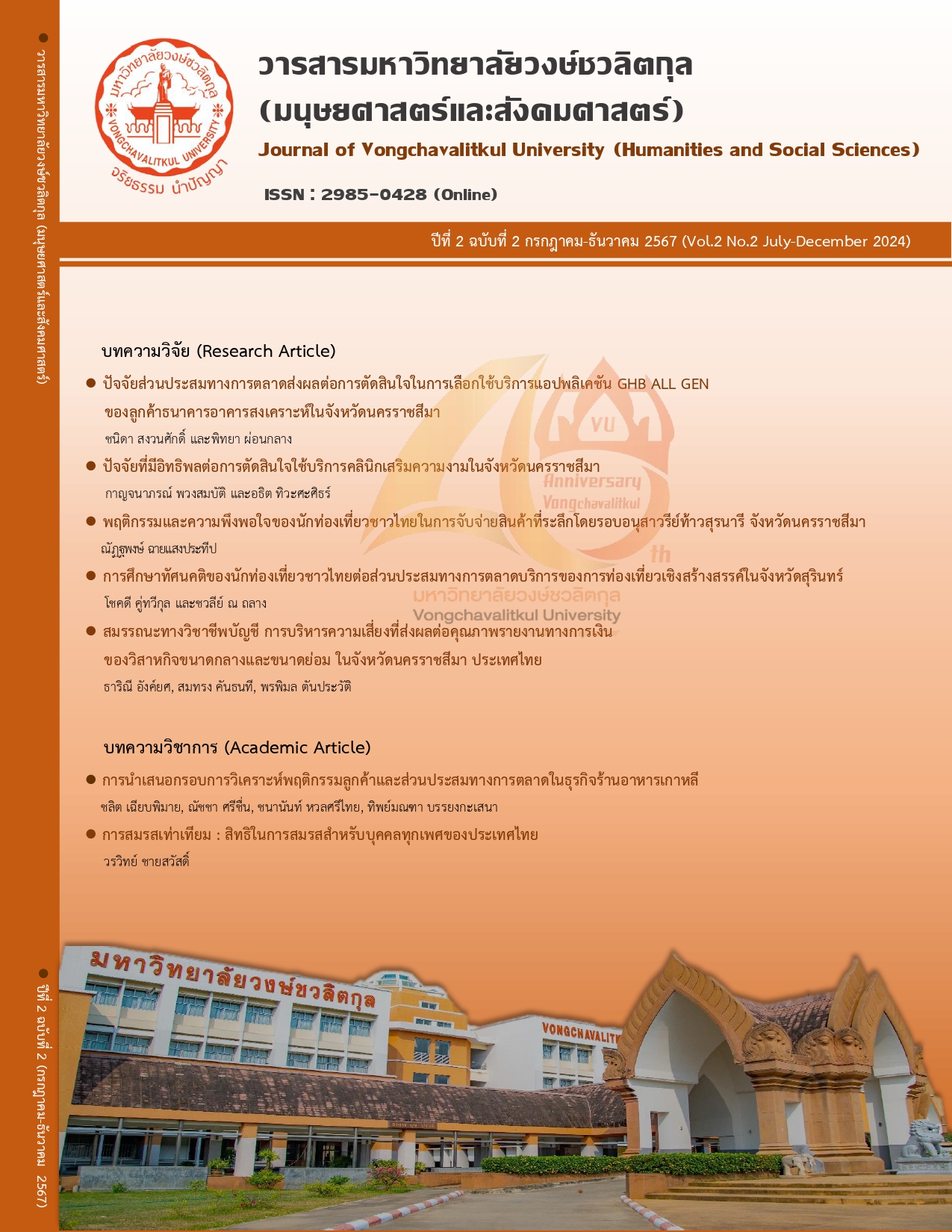สมรรถนะทางวิชาชีพบัญชี การบริหารความเสี่ยงที่ส่งผลต่อคุณภาพรายงานทางการเงินของวิสาหกิจขนาดกลางและขนาดย่อมในจังหวัดนครราชสีมา ประเทศไทย
Main Article Content
บทคัดย่อ
การวิจัยนี้มีวัตถุประสงค์เพื่อศึกษาสมรรถนะทางวิชาชีพบัญชี การบริหารความเสี่ยงที่ส่งผลต่อคุณภาพของรายงานทางการเงินของวิสาหกิจขนาดกลางและขนาดย่อมในจังหวัดนครราชสีมา ประเทศไทย เป็นการวิจัยเชิงปริมาณ โดยใช้แบบสอบถามในการเก็บรวบรวมข้อมูลจากกลุ่มผู้ประกอบการวิสาหกิจขนาดกลางและขนาดย่อมในจังหวัดนครราชสีมา จำนวน 390 ตัวอย่าง ใช้เทคนิคการสุ่มกลุ่มตัวอย่างแบบชั้นภูมิ (Stratified Random Sampling) วิธีการสุ่มแบบไม่ใช้ความน่าจะเป็น (Non-Probability sampling) และแบบเฉพาะเจาะจง (Purposive Sampling) ใช้โปรแกรมสำเร็จรูปทางสถิติวิเคราะห์ค่าร้อยละ ส่วนเบี่ยงเบนมาตรฐาน และสมการโครงสร้าง (Structural Equation Modeling: SEM)
ผลการพัฒนาแบบจำลองสมการโครงสร้างของสมรรถนะทางวิชาชีพบัญชี และการบริหารความเสี่ยงที่ส่งผลต่อคุณภาพรายงานทางการเงินของวิสาหกิจขนาดกลางและขนาดย่อมในจังหวัดนครราชสีมา พบว่า โมเดลมีความสอดคล้องกลมกลืนกับข้อมูลเชิงประจักษ์อยู่ในเกณฑ์ดี ซึ่งสมรรถนะทางวิชาชีพบัญชี และการบริหารความเสี่ยงสามารถร่วมกันอธิบายคุณภาพรายงานทางการเงินได้ร้อยละ 65 (R2 = 0.65) โดยคุณภาพรายงานทางการเงินได้รับอิทธิพลทางตรงเชิงบวกสูงสุดจากการบริหารความเสี่ยง มีค่าอิทธิพลทางตรง 𝛽 = 0.65 รองลงมาสมรรถนะทางวิชาชีพบัญชีมีค่าอิทธิพลทางตรง 𝛽 = 0.19 ที่ระดับนัยสำคัญทางสถิติ 0.01
สรุป วิสาหกิจขนาดกลางและขนาดย่อมควรให้ความสำคัญกับการบริหารความเสี่ยง ได้แก่ ด้านการประเมินความเสี่ยง ด้านการจัดการความเสี่ยง ด้านการระบุความเสี่ยง ด้านการติดตามประเมินผลและการรายงาน และความสำคัญของสมรรถนะทางวิชาชีพบัญชี ได้แก่ ทักษะด้านการจัดการบุคคล ทักษะด้านความสัมพันธ์ระหว่างบุคคลและการสื่อสาร ทักษะด้านการจัดการองค์กร ทักษะด้านปัญญา และทักษะด้านความรู้ความสามารถเชิงเทคนิค ซึ่งจะมีผลต่อคุณภาพรายงานทางการเงินของวิสาหกิจขนาดกลางและขนาดย่อมในด้านความเกี่ยวข้องกับการตัดสินใจ ความเป็นตัวแทนอันเที่ยงธรรม ความสามารถเข้าใจได้ ความน่าเชื่อถือ และความสามารถเปรียบเทียบได้
Article Details

อนุญาตภายใต้เงื่อนไข Creative Commons Attribution-NonCommercial-NoDerivatives 4.0 International License.
เอกสารอ้างอิง
กิตติยา จิตต์อาจหาญ. (2566). การบริหารความเสี่ยงในการปฏิบัติงานทางการเงินที่มีต่อคุณภาพรายงานทางการเงินของวิสาหกิจขนาดกลางและขนาดย่อมในกรุงเทพมหานครในสถานการณ์แพร่ระบาดของโควิด -19. วารสารรัฐประศาสนศาสตร์ มหาวิทยาลัยราชภัฏสวนสุนันทา, 6(1), 226-238.
ขัตติยา ด้วงสำราญ. (2564). บริหารความเสี่ยงอย่างไรให้องค์กรไร้วิกฤต. Journal of Multidisciplinary in Humanities and Social Sciences, 4(1), 340-349.
ธานินทร์ ศิลป์จารุ. (2563). การวิจัยและการวิเคราะห์ข้อมูลทางสถิติด้วย SPSS และ AMOS. (พิมพ์ครั้งที่ 18). นนทบุรี: เอส อาร์ พริ้นติ้ง แมสโปรดักส์.
มณีวรรณ ศรีปาน (2564). สมรรถนะนักบัญชีที่มีอิทธิพลต่อคุณภาพรายงานทางการเงินของสถานประกอบการในภาคตะวันออกเฉียงเหนือ. ปริญญาปรัชญาดุษฎีบัณฑิต สาขาวิชาบริหารธุรกิจและนวัตกรรมดิจิทัล. มหาวิทยาลัยมหาสารคาม. สืบค้น 8 มกราคม 2567, จาก http://202.28.34.124/dspace/ bitstream/123456789/1495/1/62010990005.pdf
. มารีนี กอรา, กุลวดี ลิ่มอุสันโน. (2560). ผลกระทบของความเป็นมืออาชีพของนักบัญชีและการบริหารความเสี่ยงที่มีผลต่อคุณภาพรายงานทางการเงินของวิสาหกิจขนาดกลางและขนาดย่อมใน 5 จังหวัดชายแดนใต้. วารสารมหาวิทยาลัยนราธิวาสราชนครินทร์ สาขามนุษย์ศาสตร์และสังคมศาสตร์, 4(2), 38-50.
ยุพาภรณ์ โมห้างหว้า. (2563). ปัจจัยความเสี่ยงและการควบคุมภายในที่ดีส่งผลต่อคุณภาพรายงานทางการเงินของวิสาหกิจขนาดกลางและขนาดย่อม ในเขตกรุงเทพมหานคร. การค้นคว้าอิสระบัญชีมหาบัณฑิต. มหาวิทยาลัยศรีปทุม. สืบค้น 8 มกราคม 2567, จาก https://dspace.spu.ac.th/handle/ 123456789/8057
รุ่งรัศมี รัชสมบัติ ,กัญญาณัฐ รัตนประภาธรรม. (2565). สมรรถนะทางวิชาชีพบัญชีที่ส่งผลต่อคุณภาพรายงานทางการเงินของนักวิชาการเงินและบัญชี ในมหาวิทยาลัยมหาสารคาม. วารสารวิทยาการจัดการ มหาวิทยาลัยราชภัฏอุดรธานี, 4(1), 13-26.
สภาวิชาชีพบัญชีในพระบรมราชูปถัมภ์. (2566). กรอบแนวคิดสำหรับการรายงานทางการเงิน (ปรับปรุง 2558). สืบคืน 10 มกราคม 2567, จาก http://www.fap.or.th/images/
สำนักงานส่งเสริมวิสาหกิจขนาดกลางและขนาดย่อม สสว. (2566). จำนวนวิสาหกิจขนาดกลางและขนาดย่อย ปี 2566. สืบคืน 4 มกราคม 2567, จาก https://opendata.sme.go.th/dataset/msme
-------- . (2564). บทสรุปผู้บริหารรายงานสถานการณ์วิสาหกิจขนาดกลางและขนาดย่อม ปี 2564. สืบค้น 4 มกราคม 2567, จาก https://www.sme.go.th/upload/ mod_download/download-20210922171225.pdf
Adedayo, Erin Olayinka; Uwuigbe, Uwalomwa; Sylvester, Eriabie; Olubukola Ranti Uwuigbe; Amiolemen, Omoike Osereme. (2019). Investment Management & Financial Innovations; Sumy, 16(4), 16-27. DOI:10.21511/imfi.16(4).2019.02
Beasley, Mark; Blay, Allen; Lewellen, Christina; McAllister, Michelle. (2023). Tempering Financial Reporting Risk through Board Risk Management. Journal of Risk and Financial Management; Basel, 16(12), 491. 1-22. DOI:10.3390/jrfm16120491
Boyatzis, R. E. (1982). The competent manager: A model of effective performance. John Wiley & Sons.
Committee of Sponsoring Organizations of the Treadway Commission (COSO). (2017). Enterprise Risk Management: Integrating with Strategy and Performance. Retrieved 11 November 2023, From https://www.coso.org/_files/ugd/3059fc_61ea 5985b03c42939 60642fdce408eaa.pdf
Cronbarch, L. J. (1990). Essential of Psychology Testing. (5thed)., New York: Harper and Row Publishers Inc.
Diamantopoulos, A. & Siguaw, J. A., (2000). Introduction to LISREL: A guide for the uninitiated. London: Sage Publications, Inc. Retrieved 11 November 2023, From https://doi.org/10. 4135/9781849209359
Erin, O., Eriki, E., Arumona, J., & Ame, J. (2017). Enterprise risk management and financial performance: Evidence from an emerging market. International Journal of Management, Accounting and Economics, 4(9), 937-952.
Erin, O., Osariemen, A., Olojede, P., Ajetunmobi, O., & Usman, T. (2018). Does risk governance impact bank performance? Evidence from the Nigerian Banking Sector. Academy of Accounting and Finance Journal, 4(1), 1-14.
FASB. (2013). A Framework-Based Approach to Teaching Accounting Property, Plant, and Equipment. Citing computer references. Retrieved 1 November 2023, From https://www.scirp.org/(S(351jmbntvnsjt1aadkposzje)/reference/ReferencesPapers.aspx?ReferenceID=1496326
Hair, J. F., Risher, J. J., Sarstedt, M., & Ringle, C. M. (2019). When to use and how to report the results of PLS-SEM. European Business Review, 31(1), 2–24.
Herath, K.S. & Albarqi, N. (2017). Financial reporting quality: A literature review. International Journal of Business Management and Commerce, 2(2), 1-14.
Kanakriyah, R. (2016). The Effect of Using Accounting Information Systems on The Quality of Accounting Information According to Users Perspective in Jordan. European Journal of Accounting, Auditing and Finance Research, 4(11), 58-75.
McClelland, D. C. (1973). Testing for competence rather than for intelligence. American psychologist, 28(1), 1-14.
Rostami, Vahab; Mohammadi, Mehdi; Mehravar, Mehdi; Kargar, Hamed. (2024). The Effect of Business Strategy on Financial Reporting Quality of the Companies by Considering Managerial Overconfidence. Iranian Journal of Management Studies; Qom, 17(4), 1031-1041. DOI:10.22059/ijms.2024.358492.675812
Rovinelli, R. J., & Hambleton, R. K. (1977). On the use of content specialists in the assessment of criterion-referenced test item validity. Tijdschrift voor Onderwijsresearch, 2(2), 49–60.
Spencer, L. M. (2001). The economic value of emotional intelligence competencies and EIC-based HR programs. In C. Cherniss & D. Goleman (Eds.), The Emotionally Intelligent Workplace. Jossey-Bass.
Wanwisa Nonpanya, Tanawadee Kangnoi, Lohar Bhupesh. (2020). Accountant Competencies Affecting The Quality Of Financial Reports Of Small And Medium Enterprises (SME) In Bangkok, Thailand. Webology, 17(3), 280-290.


